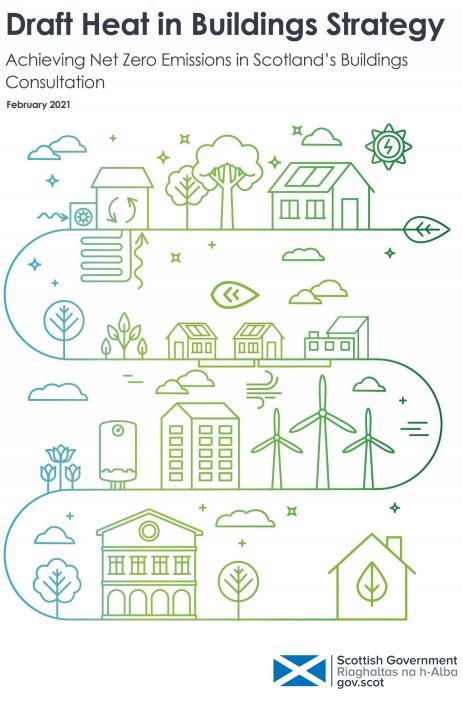Scotland publishes plans to reach net zero targets with Heat in Buildings Strategy

|
Contents |
[edit] Introduction
Plans to ensure all buildings in Scotland are warmer, more efficient and reach zero emissions by 2045 were published in February 2021 as the Draft Heat in Buildings Strategy: Achieving Net Zero Emissions in Scotland’s Buildings.
[edit] Heat in buildings strategy
The draft strategy sets out the vision to adapt more than one million homes and an estimated 50,000 non-domestic buildings to use low and zero emissions heating systems by 2030 – in line with Scotland’s Climate Change Plan (updated in December 2020) - to help meet emissions reduction targets for this date.
The strategy presents the actions and further proposals that the Scottish Government will undertake to implement the transformation and will provide thousands of jobs across the sector and wider supply chain. It also includes plans for engaging people and businesses to shape the transformation and proposals for a new regulatory framework. These regulations would require the majority of property owners to take action over time to install energy efficiency measures and zero emission heating systems.
The strategy also outlines the actions needed from the UK Government to enable faster deployment of zero emissions heating in Scotland. These measures could include early involvement in decisions on the future of the gas network and increased funding for UK-wide delivery schemes.
[edit] Scottish Government support
The Scottish Government is committed to investing £1.6 billion until 2026 to help transform the heating and energy efficiency performance of Scotland’s buildings. The investment, outlined in the current programme for Government, is expected to support up to 5,000 jobs a year by 2025-26, with further growth beyond that date.
Scotland’s Energy Minister, Paul Wheelhouse said:
“Reducing greenhouse gas emissions arising from heating our homes and buildings is one of the most important things we can do to help end Scotland’s contribution to climate change, given that heating accounts for more than half the energy we consume as a society.
“We are therefore committed to rapidly scaling-up action on decarbonising heating, but doing so in a way that ensures that our fuel poverty objectives and our commitment to tackling climate change work together, ensuring a fair and just transition to net zero emissions. This strategy must play a part in helping everyone to have a warm home that supports their good health and wellbeing."
[edit] Supporting publications
Alongside the draft heat in buildings strategy, the Scottish Government published a call for evidence to support the development of the future Low Carbon Infrastructure Transition Programme (LCITP). The call for evidence seeks input on a range of support mechanisms for the development and delivery of large-scale low and zero carbon heat that will be offered from September 2021.
In addition, a consultation on Scottish skills requirements for energy efficiency, zero emissions and low carbon heating systems, microgeneration and heat networks for homes was been published. These requirements, which form part of Scotland’s Climate Emergency Skills Action Plan, will help professionalise the sector and provide career pathways for young people.
The Scottish Government has also published the analysis of responses to the improving energy efficiency in owner occupied homes consultation.
The consultation on the draft was open until 30 April 2021.
[edit] Related articles on Designing Buildings
- Achieving net zero in social housing.
- Building heating systems.
- Carbon Neutral Islands.
- Heat Networks (Scotland) Bill.
- Low carbon building standards strategy for Scotland.
- Net zero carbon 2050.
- Scottish Government urged to review infrastructure.
- Scottish housing standard.
- Scottish planning policy.
- Skilled workforce unable to meet net zero ambitions.
- Sustainability.
- Sustainable Buildings Monitor.
- Types of domestic heating system.
- Zero carbon homes.
[edit] External resources
- Scottish Government, Consultation on Scottish skills requirements for energy efficiency, zero emissions and low carbon heating systems, microgeneration and heat networks for homes February.
- Scottish Government, Draft Heat in Buildings Strategy: Achieving Net Zero Emissions in Scotland’s Buildings consultation.
- Scottish Government, Energy Efficient Scotland - improving energy efficiency in owner-occupied homes: consultation analysis.
- Scottish Government, The Low Carbon Infrastructure Transition Programme (LCITP) : Call for Evidence to Support Development of Future Programme.
- Scottish Government, Update to the Climate Change Plan 2018 – 2032 Securing a Green Recovery on a Path to Net Zero.
Featured articles and news
A case study and a warning to would-be developers
Creating four dwellings... after half a century of doing this job, why, oh why, is it so difficult?
Reform of the fire engineering profession
Fire Engineers Advisory Panel: Authoritative Statement, reactions and next steps.
Restoration and renewal of the Palace of Westminster
A complex project of cultural significance from full decant to EMI, opportunities and a potential a way forward.
Apprenticeships and the responsibility we share
Perspectives from the CIOB President as National Apprentice Week comes to a close.
The first line of defence against rain, wind and snow.
Building Safety recap January, 2026
What we missed at the end of last year, and at the start of this...
National Apprenticeship Week 2026, 9-15 Feb
Shining a light on the positive impacts for businesses, their apprentices and the wider economy alike.
Applications and benefits of acoustic flooring
From commercial to retail.
From solid to sprung and ribbed to raised.
Strengthening industry collaboration in Hong Kong
Hong Kong Institute of Construction and The Chartered Institute of Building sign Memorandum of Understanding.
A detailed description from the experts at Cornish Lime.
IHBC planning for growth with corporate plan development
Grow with the Institute by volunteering and CP25 consultation.
Connecting ambition and action for designers and specifiers.
Electrical skills gap deepens as apprenticeship starts fall despite surging demand says ECA.
Built environment bodies deepen joint action on EDI
B.E.Inclusive initiative agree next phase of joint equity, diversity and inclusion (EDI) action plan.
Recognising culture as key to sustainable economic growth
Creative UK Provocation paper: Culture as Growth Infrastructure.





















